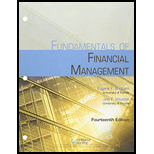
Bundle: Fundamentals of Financial Management, 14th + MindTap Finance, 1 term (6 months) Printed Access Card
14th Edition
ISBN: 9781305777118
Author: Eugene F. Brigham, Joel F. Houston
Publisher: Cengage Learning
expand_more
expand_more
format_list_bulleted
Question
Chapter 19, Problem 10P
Summary Introduction
To determine: The percentage of the risk free securities in Country U.
Introduction:
Interest rate parity: Interest rate parity is the theory which is used to show the relationship between the future rate and the spot rate of the two country currency.
Expert Solution & Answer
Want to see the full answer?
Check out a sample textbook solution
Students have asked these similar questions
Help with questions
Please help with questions
Create financial forecasting years 2022, 2023, and 2024 using this balance sheet.
Chapter 19 Solutions
Bundle: Fundamentals of Financial Management, 14th + MindTap Finance, 1 term (6 months) Printed Access Card
Ch. 19 - Why do U.S. corporations build manufacturing...Ch. 19 - Prob. 2QCh. 19 - Prob. 3QCh. 19 - Should firms require higher rates of return on...Ch. 19 - Does interest rate parity imply that interest...Ch. 19 - Prob. 6QCh. 19 - Prob. 7QCh. 19 - Prob. 1PCh. 19 - Prob. 2PCh. 19 - Prob. 3P
Ch. 19 - Prob. 4PCh. 19 - Prob. 5PCh. 19 - Prob. 6PCh. 19 - CURRENCY APPRECIATION Suppose that 1 Danish krone...Ch. 19 - Prob. 8PCh. 19 - Prob. 9PCh. 19 - Prob. 10PCh. 19 - Prob. 11PCh. 19 - INTEREST RATE PARITY Assume that interest rate...Ch. 19 - Prob. 13PCh. 19 - EXCHANGE GAINS AND LOSSES You are the vice...Ch. 19 - Prob. 15PCh. 19 - Prob. 16PCh. 19 - FOREIGN CAPITAL BUDGETING Solitaire Machinery is a...Ch. 19 - Prob. 19IC
Knowledge Booster
Learn more about
Need a deep-dive on the concept behind this application? Look no further. Learn more about this topic, finance and related others by exploring similar questions and additional content below.Similar questions
- Beta Company Ltd issued 10% perpetual debt of Rs. 1,00,000. The company's tax rate is 50%. Determine the cost of capital (before tax as well as after tax) assuming the debt is issued at 10 percent premium. helparrow_forwardFinance subject qn solve.arrow_forwardPlease help with questionsarrow_forward
arrow_back_ios
SEE MORE QUESTIONS
arrow_forward_ios
Recommended textbooks for you
 Intermediate Financial Management (MindTap Course...FinanceISBN:9781337395083Author:Eugene F. Brigham, Phillip R. DavesPublisher:Cengage Learning
Intermediate Financial Management (MindTap Course...FinanceISBN:9781337395083Author:Eugene F. Brigham, Phillip R. DavesPublisher:Cengage Learning

Intermediate Financial Management (MindTap Course...
Finance
ISBN:9781337395083
Author:Eugene F. Brigham, Phillip R. Daves
Publisher:Cengage Learning

The Exchange Rate and the Foreign Exchange Market [AP Macroeconomics Explained]; Author: Heimler's History;https://www.youtube.com/watch?v=JsKLBpy6cEc;License: Standard Youtube License